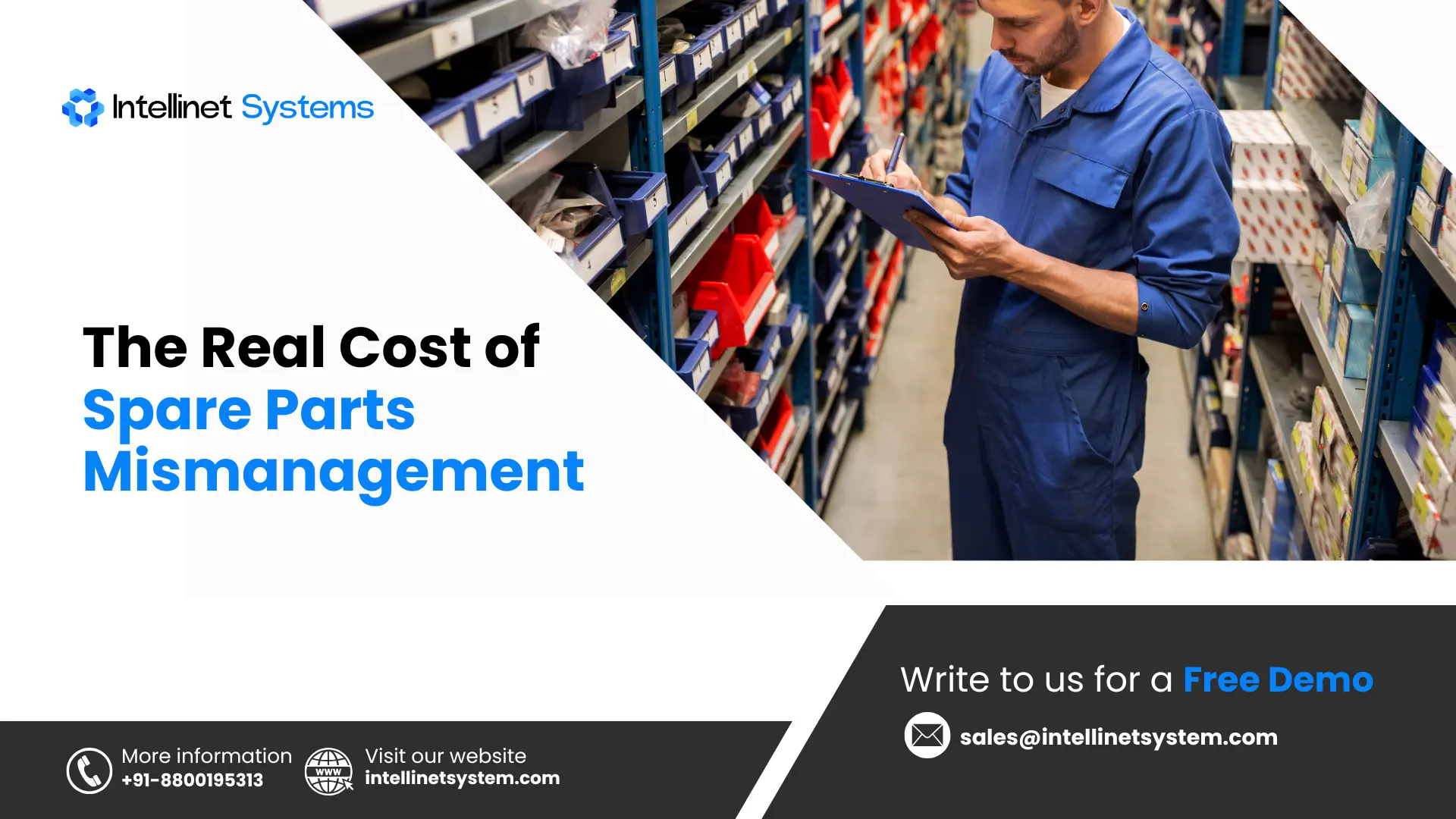
Consider a vehicle on a service lift, a technician stuck, and a customer waiting, all because a part is misidentified or unavailable. In the automotive industry, such inefficiencies escalate into billions in lost revenue annually.
Poor spare parts management impacts OEMs, suppliers, dealerships, and repair networks alike, from inaccurate forecasts to wrong orders; these inefficiencies add hidden costs to eroding profitability and customer satisfaction. Outdated catalogs only worsen these challenges.
This blog examines how poor spare parts management erodes profitability and customer satisfaction, while highlighting Intelli Catalog, a digital solution simplifying spare parts management.
The Multi-Billion Dollar Problem: Common Pain Points

Inefficiency in spare parts management is not a minor inconvenience; it’s a financial drain on the entire automotive ecosystem. From locking up capital in unused inventory to losing customers due to wrong repairs, the costs pile up. Below are the major pain points that cause billions of hidden losses yearly.
1. Inventory Inefficiencies (Overstocking and Understocking)
Poor forecasting in spare parts management often creates a costly imbalance. In case of overestimation of demand, OEMs and dealers are left with surplus inventories in warehouses. It holds working capital, raises storage costs, and exposes the company to obsolescence.
On the other hand, understocking is equally damaging. Limited availability of essential spare parts leads to reduced spare part availability, lost sales, and customer dissatisfaction. These lost sales further diminish revenue and erode customer faith; it puts an OEM under long-term financial strain.
Through addressing the above issues of understocking and overstocking, businesses can guarantee a 30% reduction in inventory costs. This significant reduction shows the importance of streamlining spare parts management processes.
2. Incorrect Part Identification and Wrong Parts Ordering
The incorrect ordering of parts is not just a minor error; it eventually sets off an expensive chain reaction. Misidentifying a spare part often means shipping, receiving, and returning parts multiple times. Each step consumes resources, increases transport costs, and wastes valuable time.
Dealerships and service centres are especially vulnerable when relying on traditional parts catalogs. These outdated systems require manual lookups where parts with a similar appearance can be mistakenly interchanged. Minor errors increase exponentially across vast networks, resulting in wrongdoing on repeat and angry customers.
Such inefficiencies lead directly to margin pressure in the automotive aftermarket. A dealer spending time rectifying wrong orders cannot sell or provide customer service. Wrong parts ordering results in millions of avoidable losses accrued over the years for OEMs and their dealer networks.
3. Customer Dissatisfaction and Lost Loyalty
Delays in the availability of spare parts hamper the service process, making the customers wait for longer periods for essential repairs. When vehicles or equipment remain held up at the workshop, the angry customers start losing their faith in the dealer or the manufacturer (OEM).
Wrong parts orders or misidentification leading to repeat service visits only further complicate matters from the customer’s perspective. Customers expect it done right the first time, and when this expectation is not achieved, then customers view the service network as inefficient or unreliable.
In the automotive aftermarket, these inefficiencies carry forward well past the immediate lost sales. Poor spare parts management gradually reduces long-term brand loyalty, converting customers over to third-party suppliers who can promise faster service and availability they can depend on.
4. Revenue Leakage
Out-of-date processes involving static catalogs and manual spreadsheets slow spare parts management. These inefficiencies commonly cause errors that come with wrong orders, returns, and additional handling costs that directly drain profit.
However, with manual mistakes, dealers might misidentify parts or miss available alternatives. And delays in services also cause OEMs to miss upselling opportunities, whether bundled parts or even region-specific promotions to boost revenues.
With the inefficient systems, OEMs never properly forecast demand nor track stock in real time. The result is poor spare parts management, with unfulfilled demand causing revenue leakage and customers shifting to third-party suppliers, further weakening long-term profitability.
5. Operational Inefficiencies
Poor spare parts management results in operational delays at the OEMs, suppliers, and dealerships across the whole supply chain of inventory and sales systems. The fragmented systems and manual data entry make it difficult to keep real-time stock levels, price updates, or part revisions into account.
These present wasted labor opportunities; hence, more time is spent searching for parts than repairing vehicles. Parts managers juggle spreadsheets and phone calls instead of focusing on customer service. These inefficiencies create bottlenecks that reduce overall productivity.
Without an integration between ERP, DMS, and catalog systems, information barriers emerge. However, gaps in information tie up visibility, and such an absence leads to errors and delays, amongst others. For large OEMs, even a small operational lag multiplied across thousands of dealerships becomes a billion-dollar problem.
How Intelli Catalog Solves the Problem and Stops the Financial Drain

The issues faced in spare parts management are considerably high, yet none of them can be accepted as inevitable. Contemporary digital solutions are there to eliminate inefficiencies, errors, and poor practices in managing aftermarket operations by OEMs and dealers.
Intelli Catalog is one such software solution that simplifies spare parts management with advanced search tools, 2D/3D visuals, and AI-powered features to directly tackle misorders and inefficiencies.
1. Fix Inventory Inefficiencies with AI-Powered Forecasting
OEMs usually struggle to manage vast spare parts data with outdated manual methods, causing expensive inefficiencies and misjudgments. Intelli Catalog tackles these issues of forecast problems by combining real-time data, machine learning, and predictive analytics.
By studying historical sales, seasonal trends, product lifecycles, and economic conditions, it estimates demand with very high accuracy. In this way, it guarantees that the most crucial parts are stocked, thus avoiding overstocking, understocking, and unnecessary expenses.
Key benefits of AI-powered forecasting:
- Accurate Demand Forecasting: Precise spare parts demand forecasting to eliminate stockouts and overstocking.
- Operational Efficiency: Watched operations that foster JIT (Just-in-Time) manufacturing.
- Cost Reduction: Cutting costs of overstock and rush order processing.
- Customer Satisfaction: Reduces downtime with timely part availability.
- Proactive Risk Management: Anticipates disruptions and sudden demand spikes.
- Real-Time Decision Making: Automatically adjusts inventory based on market conditions.
- Sustainability: Minimises waste, lowering the carbon footprint.
2. Ensure Accuracy with Smart Part Identification
Misidentification is one of the leading reasons that potentially causes financial losses while handling spare parts. Intelli Catalog prevents these issues, depending on the more advanced features of VIN-based lookup, visual search, and interactive 2D/3D diagrams.
Dealers no longer rely on assumptions to determine the right part; they can visually confirm the part to be ordered or check for compatibility using vehicle identification numbers. This visual confirmation drastically reduces order errors and returns.
How Intelli Catalog ensures accuracy:
- VIN-based lookup: Ensures matching of parts appropriate to vehicle specifications, thus preventing mismatches.
- Interactive diagrams: This feature allows for visually selecting the right part via easily controllable 2D/3D catalogs.
- Visual search aids: Offer quick identification through uploading images or side-by-side comparisons of part visuals.
3. Boost Customer Satisfaction with Faster Service
Timely and correct service is a foundation of customer trust. Intelli Catalog minimizes the time spent on repair by easing the burden on spare parts management. VIN-based filtering, automated search, and clear visual illustrations allow identifying the right part within a moment, and start repairing it without any additional delay.
The quicker the delivery of a service, the shorter the time spent waiting by the customers, and the lower the number of repeat visits. For this reason, OEMs and dealers tend to build long-lasting alliances, ensuring customers wait less time and are able to get adequate repair done at least.
Benefits of faster service include:
- Reduced turnaround times: The parts can be found and ordered almost instantly, ensuring no unnecessary halting of a repair occurs.
- First-time accuracy: Customers do not have to return again for it to be fixed for the same concern.
- Stronger brand loyalty: Trustworthy service builds trust in the brand, encouraging repeat business.
4. Plug Revenue Leakage with Automated Controls
Revenue leakage in spare parts management often arises from wrong orders, outdated catalogs, and inefficiencies in demand planning. Intelli Catalog eliminates these challenges with automated controls that optimise the entire process.
By effectively managing demand forecasting and real-time catalog updates, OEMs avoid overstocking, unnecessary expenses, and increased parts availability. This puts a stop to leakage in inventory and makes sure revenues keep rising with great customer service and efficient processes.
Intelli Catalog plugs revenue leakage by saving up to 30% from reduced overstocking through its AI-powered demand prediction.
Key benefits of automated controls:
- Increased spare parts sales: Ensures availability of the right parts at the right time.
- Demand forecasting: Avoids overstocking and excess holding costs.
- Avoiding understocking: Ensuring timely availability to minimize repair downtime and cost overruns.
- Lower wrong orders: Automated processes reduce errors and associated costs.
- Cloud-based Catalog: Real-time updates minimise distribution costs and ensure accuracy.
5. Streamline Operations with Centralized, Real-Time Data
Fragmented systems are considered among the greatest warehouse obstacles to effective spare part management. Intelli Catalog resolves this by integrating with ERP and DMS platforms, creating a unified system.
Pricing, inventory, and revision information are displayed in real-time for dealers, suppliers, and OEMs, thus removing any barriers and administrative work. Since it is centralized data, eliminating operational bottlenecks leads to enhanced productivity across the network.
Operational advantages of real-time integration include:
- Unified platform: This integrates and presents data in a single user interface from ERP, DMS, and the catalog.
- Real-time updates: Ensures the accuracy of the parts, prices, and revisions all the way through the supply chain.
- Reduced admin burden: Allows service staff to focus on service by cutting time spent on manual tracking.
Conclusion: The Path Forward - Invest in Smarter Management
Billions are lost annually in automotive spare parts due to inefficient management: overstocking, misorders, revenue leakage, and loyalty loss. OEMs, dealers, and suppliers cannot afford to rely on traditional ways in a highly competitive market.
Intelli Catalog is a smarter solution with AI-driven predictive analytics and real-time integration. It helps OEMs and dealers to cut costs and gain operational efficiency, besides boosting customer confidence. These are systems worth investing in beyond the mere technology upgrade, if only to safeguard the revenue and ensure future competitiveness.
Inefficient spare parts management is no longer sustainable in today’s competitive market. Book a free demo to know how Intelli Catalog can redefine your spare parts management operations, unlock efficiency, and secure long-term ROI.
Explore More Insights
About the Author
Chandra Shekhar
Chandra Shekhar is the Senior Manager, Strategy & Business Development at Intellinet Systems. With over a decade of experience in the automotive industry, Chandra Shekhar has led digital transformation and aftersales strategy initiatives for OEMs across multiple markets. His background combines deep industry knowledge with a practical understanding of how technology can solve real operational challenges. He focuses on making complex ideas clear and relevant for automotive and aftermarket professionals navigating ongoing change.



























